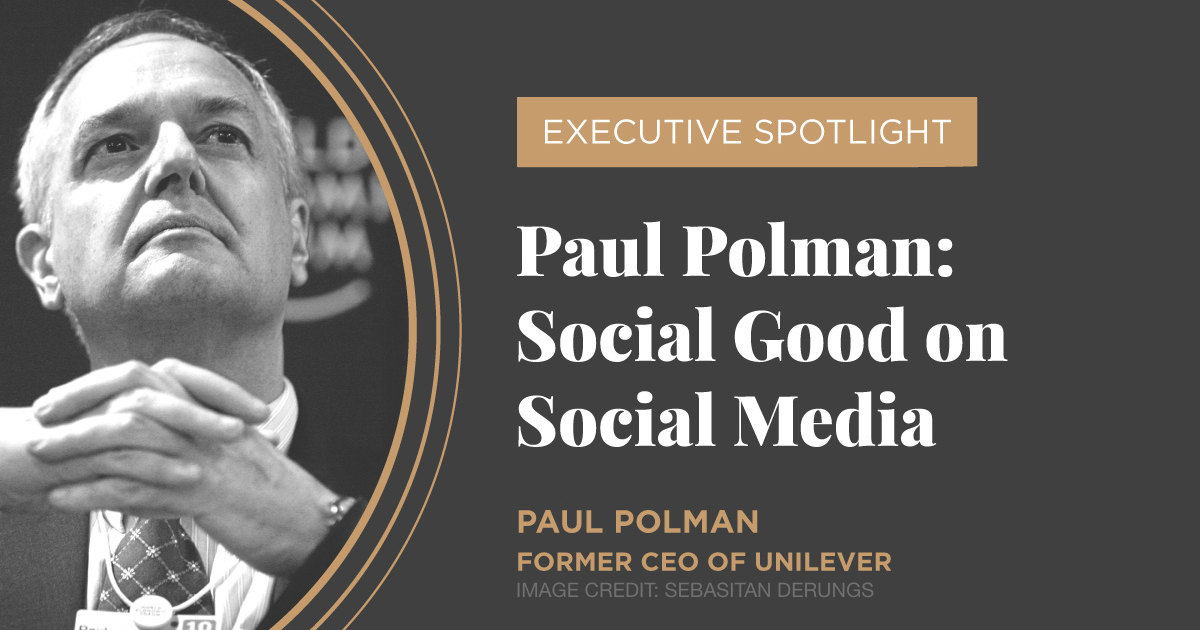Last week, Unilever’s Paul Polman announced that he will be stepping down from his position as CEO of one of the world’s biggest consumer goods businesses, which owns prominent brands such as Axe, Dove, Lipton, Magnum, and many others. Although Unilever praised Polman’s work in its press release announcing his retirement, Polman was a polarizing figure throughout his career at the company. Many shareholders believed he did not focus enough on profits and was instead too concerned with social good. Of course, many others praised him for the exact same reason. Regardless of which side you’re on, Polman’s personal social media marketing strategy was undeniably well thought out. This influential executive used social media marketing as a means to promote his thought leadership and, by extension, his company. While many other sources are, at this moment, recording Polman’s professional legacy, in this edition of Executive Spotlight by Influential Executive, we’ll take a closer look at the former CEO’s Twitter legacy.
Consistent Commitment
Just a glance at Paul Polman’s Twitter content makes it clear what the overarching message is: Polman is a humanitarian. He cares about social good. He wants to save the earth. This messaging not only drives his reputation as an individual, but by extension, Unilever’s reputation. At the time that this article is being written, the Unilever homepage primarily features wholesome imagery of nature and families, and there is an entire section of the website dedicated to the company’s stance on sustainable living.
This goal of shedding light on Polman’s and Unilever’s commitment to humanitarianism is reflected in everything on Polman’s Twitter profile, even his cover photo, which portrays a child holding up a globe along with the quote, “We do not inherit the Earth from our ancestors. We borrow it from our children.” His tweets follow this theme closely as well. For instance, he often tweets about Unilever’s social good efforts:
Pleased @Unilever is partnering with @Ioniqa, who are building a factory capable of continuously upcycling 10,000 tonnes of PET plastic – one of the most commonly used. Currently only 10-20% reused globally https://t.co/9zW406BPZk pic.twitter.com/oi4Ih0bGHL
— Paul Polman (@PaulPolman) November 27, 2018
He posts inspirational messages on the topic of social change accompanied by original graphics:
If you won the life lottery and were born somewhere safe, with enough to eat, with access to education, and choice about your life, isn’t it your duty to put yourself to the service of those who were not? #WednesdayWisdom pic.twitter.com/RbECanQD9g
— Paul Polman (@PaulPolman) November 28, 2018
And, not only does he talk the talk, but he encourages his followers to take concrete action as well:
Kevin Carey talking at the launch of the new Orbit machine in Kenya with #KBT #myvision Now technology will be available for all @kiliblindtrust .Please help more children get access to education by donating to https://t.co/Y39jsjy21V pic.twitter.com/opCpSpmrFD
— Paul Polman (@PaulPolman) November 23, 2018
Polman’s content is nearly exclusively centred around social good. He doesn’t just rely on one content series, either—his posts range from authentic, real-time coverage of his attendance at a conference on education in Kenya to quote graphics that are likely planned far in advance. This underlying theme and cohesive messaging is reflected in all of his content and cements his overall image as a humanitarian executive.
Effective Retweets
Even Polman’s retweets are consistent with this message of social awareness—both in terms of social good and social media. Retweeting, when done effectively, can be a powerful tool that increases your total number of impressions (a social media marketing term meaning the number of times a tweet has been seen), helps promote other related accounts, encourages reciprocal engagement, and demonstrates that a user is engaged with the industry conversation. Using this tactic further establishes Polman as a deeply involved thought leader and someone who is humble enough to promote the thoughts of others.
The content he retweets is also chosen strategically. He retweets content from individual brands beneath the Unilever umbrella, such as the Vaseline brand account. This digital marketing strategy takes advantage of the fact that executives outperform their brands on social media by using an individual to promote overall brand objectives.
More than a household staple—Vaseline Jelly is helping to improve skin health worldwide. Watch and see how. pic.twitter.com/3JSytI0uNK
— Vaseline (@VaselineBrand) August 13, 2018
When he’s not retweeting the many brands that he owns for promotional purposes, Polman retweets his fellow prominent thought leaders, usually on the topic of—you guessed it—social good.
Great to see staff from the UN @globalcompact office in New York meeting with our #LocalNetworks around the world to further increase collaboration and knowledge-sharing. This week, we meet with #LatAm Networks to push our mission forward. https://t.co/ElcNpkC7Vx
— Lise Kingo (@Lise_Kingo) November 13, 2018
Room for Improvement
Here at Influential Executive, we believe that proper—or at the very least, passable—grammar should be a bare minimum for any executive who wants to establish a social media presence. A mistake here and there likely wouldn’t detract much from a CEO’s reputation, as content is almost always the most important piece of a profile, but a mistake in every post begins to undermine the credibility of the thought leader and look sloppy. Unfortunately, Paul Polman’s consistency in his social good theme does not extend to his consistency with punctuation. More often than not, Polman neglects to add a simple period to the ends of his tweets.
Additionally, although the content that Polman posts is well thought out and relevant, the tone of his copy leaves something to be desired. We previously examined how Uber CEO Dara Khosrowshahi effectively adds a personal touch to his tweets in order to humanize himself and the company. Polman, and Unilever, should the company decide to continue promoting this messaging strategy after Polman’s departure, should consider using more emotionally charged language in their posts. This will make the humanitarian message feel more authentic and engaging.
It will be interesting to see if either Polman’s or Unilever’s social media strategy will change at all following his retirement. One thing is for sure: as Polman leaves Unilever, he leaves behind a legacy of social awareness and sustainability, which was bolstered by the effective use of social media marketing on Twitter.


